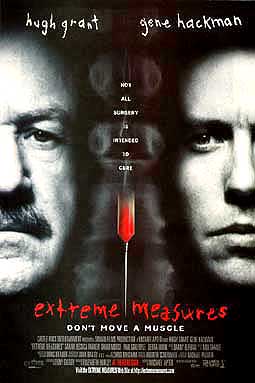Extreme Measures
Extreme Measures is a term that refers to actions taken that are significantly beyond what is considered common or standard practice. These measures are often employed in situations deemed critical or when conventional methods have failed to resolve an issue. The concept can apply across various fields, including medicine, law enforcement, military strategy, and public policy.
Overview[edit | edit source]
In medicine, extreme measures may involve experimental treatments or surgeries that are either unproven or have a high risk of failure or severe side effects. These measures are typically considered only when all standard treatments have been exhausted and the patient's condition is life-threatening.
In the context of law enforcement and military strategy, extreme measures might include tactics or operations that are outside the norm due to their intensity, risk, or the ethical questions they raise. Examples could include the use of lethal force in situations where it is not typically warranted or the implementation of mass surveillance to prevent crime or terrorism.
Public policy can also see the use of extreme measures, particularly in response to crises such as pandemics, natural disasters, or severe economic downturns. These might include lockdowns, significant restrictions on civil liberties, or extraordinary financial interventions.
Ethical Considerations[edit | edit source]
The use of extreme measures often brings about significant ethical considerations. The balance between the potential benefits and the risks or moral compromises involved is a subject of considerable debate. In medicine, the principle of do no harm must be weighed against the potential to save a life or significantly improve its quality. In law enforcement and military contexts, the need for security must be balanced against the rights and freedoms of individuals. Public policy decisions involving extreme measures must consider the impact on the population's well-being and freedoms.
Examples[edit | edit source]
- In medicine, the use of an unapproved drug under a compassionate use protocol can be considered an extreme measure.
- The implementation of martial law in response to civil unrest is an example of an extreme measure in public policy.
- The use of drone strikes in areas not formally recognized as war zones by military strategy.
Controversies[edit | edit source]
Extreme measures often lead to controversies, particularly regarding their effectiveness, ethical implications, and the transparency of the decision-making process. Critics argue that such measures can lead to abuses of power, unintended consequences, and the erosion of trust in institutions. Supporters often contend that extreme measures are necessary responses to extraordinary circumstances that cannot be addressed through standard practices.
Conclusion[edit | edit source]
Extreme measures are a complex and often contentious aspect of decision-making in critical situations. While they can offer a means to address dire circumstances, they also pose significant ethical, legal, and social challenges. The debate over when and how to employ these measures is likely to continue as societies face new and unprecedented challenges.
| Extreme Measures Resources | |
|---|---|
|
|
Search WikiMD
Ad.Tired of being Overweight? Try W8MD's physician weight loss program.
Semaglutide (Ozempic / Wegovy and Tirzepatide (Mounjaro / Zepbound) available.
Advertise on WikiMD
|
WikiMD's Wellness Encyclopedia |
| Let Food Be Thy Medicine Medicine Thy Food - Hippocrates |
Translate this page: - East Asian
中文,
日本,
한국어,
South Asian
हिन्दी,
தமிழ்,
తెలుగు,
Urdu,
ಕನ್ನಡ,
Southeast Asian
Indonesian,
Vietnamese,
Thai,
မြန်မာဘာသာ,
বাংলা
European
español,
Deutsch,
français,
Greek,
português do Brasil,
polski,
română,
русский,
Nederlands,
norsk,
svenska,
suomi,
Italian
Middle Eastern & African
عربى,
Turkish,
Persian,
Hebrew,
Afrikaans,
isiZulu,
Kiswahili,
Other
Bulgarian,
Hungarian,
Czech,
Swedish,
മലയാളം,
मराठी,
ਪੰਜਾਬੀ,
ગુજરાતી,
Portuguese,
Ukrainian
Medical Disclaimer: WikiMD is not a substitute for professional medical advice. The information on WikiMD is provided as an information resource only, may be incorrect, outdated or misleading, and is not to be used or relied on for any diagnostic or treatment purposes. Please consult your health care provider before making any healthcare decisions or for guidance about a specific medical condition. WikiMD expressly disclaims responsibility, and shall have no liability, for any damages, loss, injury, or liability whatsoever suffered as a result of your reliance on the information contained in this site. By visiting this site you agree to the foregoing terms and conditions, which may from time to time be changed or supplemented by WikiMD. If you do not agree to the foregoing terms and conditions, you should not enter or use this site. See full disclaimer.
Credits:Most images are courtesy of Wikimedia commons, and templates Wikipedia, licensed under CC BY SA or similar.
Contributors: Prab R. Tumpati, MD

